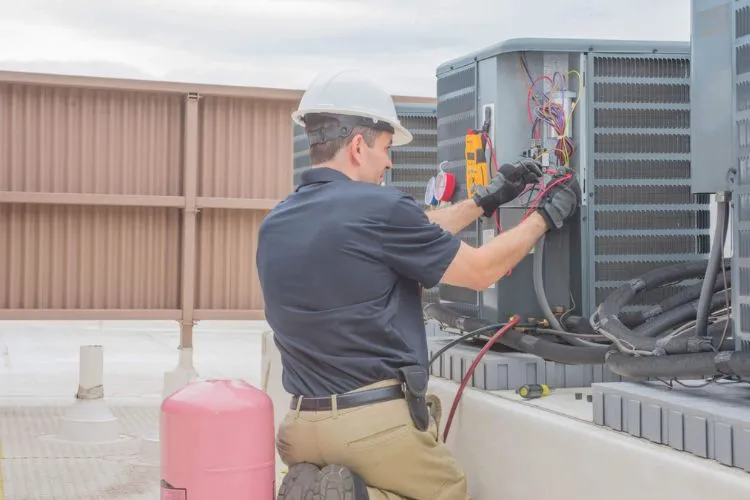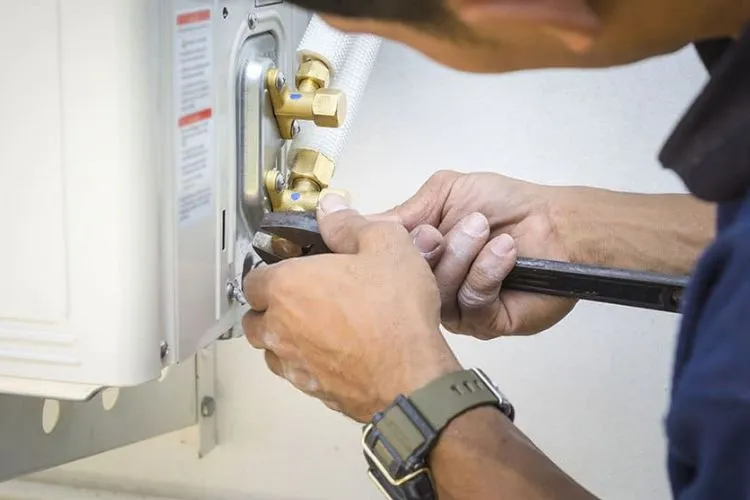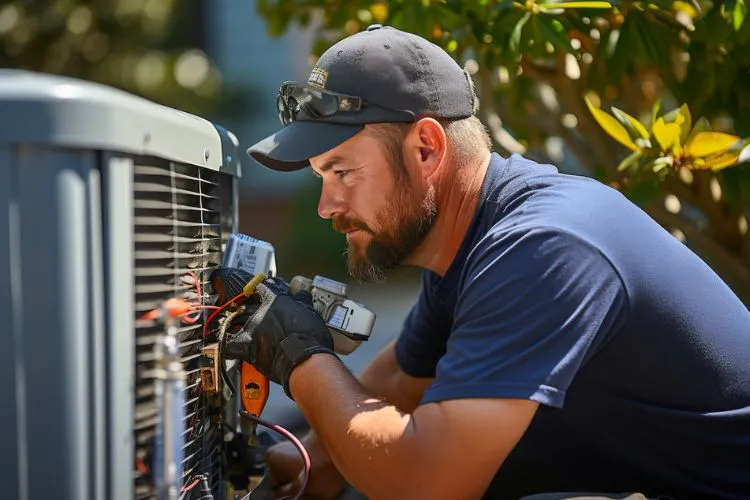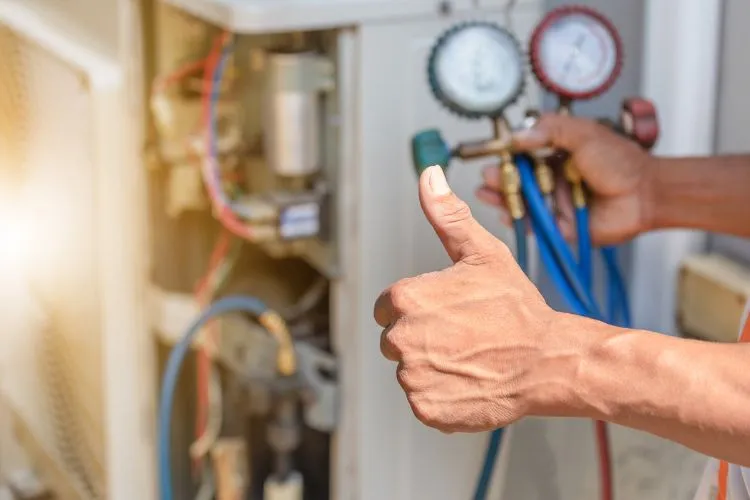Maintaining a comfortable indoor environment is crucial for both homes and workplaces. Key to this comfort is the Heating, Ventilation, and Air Conditioning (HVAC) system, which regulates temperature and air quality.
But to keep it running smoothly, regular servicing is vital. So, do you know how often should my HVAC be serviced?
In this article, we delve into the importance of regular HVAC maintenance, the recommended frequency for servicing, what servicing includes, and how to choose the right service provider.

Understanding HVAC Maintenance
HVAC systems play a pivotal role in ensuring indoor comfort. They do more than just heat or cool the space.
They also filter out pollutants and circulate fresh air, contributing to healthier indoor environments.
Given their central role, it’s clear that these systems require regular upkeep to continue operating efficiently.
How Often Should My HVAC Be Serviced?
Routine servicing of your HVAC system comes with several benefits.
Firstly, it ensures the system runs efficiently, which can lead to lower energy bills.
Secondly, it can extend the system’s lifespan, saving you money in the long run.
Thirdly, it improves indoor air quality, which is crucial for health.
Lastly, regular checks help identify and fix potential issues early, preventing costly repairs.
For most heating and cooling systems, a professional inspection at least once a year is necessary. Ideally, servicing for cooling systems should be in the spring, and heating systems in the fall.
Ventilation systems, due to their role in air quality, might require check-ups twice a year, especially in areas with high levels of pollutants.

Several factors can affect how often your HVAC needs servicing. Homes with pets, smokers, or residents with allergies may need more frequent servicing.
Additionally, living in a high-pollution or high-humidity area can also necessitate more regular checks.
What Does HVAC Servicing Include?
A comprehensive service appointment covers various tasks. Technicians inspect all components of the system, clean vital parts like filters and coils, and lubricate moving parts to ensure everything runs smoothly.
For cooling systems, checking and refilling refrigerant levels are also key tasks. Moreover, ensuring that the system controls and thermostat are functioning correctly is part of the service.
DIY Maintenance Tips Between Services
While professional servicing is crucial, there are maintenance tasks you can handle yourself. Regularly changing or cleaning air filters can greatly affect your system’s efficiency.
Keeping the area around outdoor units clean and ensuring indoor vents are not blocked can also help maintain your system’s health between professional services.
Choosing an HVAC Service Provider
Selecting a reliable HVAC service professional is crucial. Look for providers with valid credentials and positive reviews.
Consider opting for a service contract, which can offer peace of mind through regular, scheduled maintenance.

Common Signs Your HVAC Needs Servicing Sooner
Recognizing the signs that your HVAC system needs servicing can prevent minor issues from escalating into major repairs. Here are signs to watch for:
- Unusual Noises: An HVAC system typically operates with a consistent, low-level sound. If you notice sudden rattling, buzzing, or whistling noises, this could indicate loose parts, electrical issues, or blockages within the system.
- Strange Odors: Your HVAC should not emit strong odors. A musty smell may signal mold presence, while a burnt scent could point to electrical problems.
- Short Cycling: Short cycling refers to the HVAC system frequently turning on and off, failing to complete a full heating or cooling cycle. This behavior can stress the system and might suggest thermostat issues or incorrect sizing.
- Increase in Energy Bills: A sudden rise in energy costs, notwithstanding normal seasonal temperature changes, can suggest the system is working harder than it should, potentially due to a malfunction or the need for a tune-up.
- Reduced Airflow: If there’s a noticeable drop in airflow from your vents, it could be due to blockages, a failing compressor, or problems with the ducts.
Awareness of these signs is essential for timely intervention, ensuring your HVAC system remains in optimal condition.
Pro Tips
Maintaining a record of all servicing and repairs can be immensely helpful for both homeowners and service technicians. Additionally, investing in a smart thermostat can not only improve efficiency but also signal when your system needs attention.
Finally, adopting energy conservation methods can further reduce strain on your HVAC system, maintaining its efficiency and prolonging its life.
In summary, understanding the needs of your HVAC system and ensuring it receives regular maintenance is essential for its longevity and your comfort.
By following the guidelines outlined in this article, you can enjoy a well-functioning HVAC system for years to come.
Safety Considerations in HVAC Maintenance

Regular HVAC maintenance is crucial for ensuring the safety of a home’s occupants. Neglecting this task can lead to serious risks, such as carbon monoxide leaks from malfunctioning furnaces which are odorless and potentially lethal.
Additionally, improper care can result in electrical issues, posing fire hazards. Therefore, servicing your HVAC system periodically is essential to prevent these dangers and maintain a safe living environment.
Frequently Asked Questions (FAQs)
How can I tell if my HVAC system needs servicing?
Unusual noises, increased energy bills, and poor performance are common indicators that your HVAC system may require professional servicing.
Can I perform any HVAC maintenance tasks myself?
Yes, tasks such as replacing air filters and keeping the area around your HVAC system clean are both recommended and safe for homeowners.
What happens if I skip HVAC maintenance?
Skipping routine maintenance can lead to reduced efficiency, higher utility bills, poor air quality, and even system failure.
Is it worth getting a service contract for my HVAC?
A service contract can offer peace of mind through scheduled maintenance and potentially save money in the long run by avoiding costly repairs.
How long does an HVAC service appointment typically take?
A typical service appointment can vary but usually takes a few hours, depending on the system’s condition and specific service tasks.
Conclusion:
The key to a long-lasting, efficient HVAC system is regular maintenance. Not only does it ensure your system runs efficiently, but it also improves the air quality in your home and prevents unexpected issues.
By understanding the importance of HVAC maintenance, knowing the recommended service frequency, and recognizing signs that service is needed, you can keep your HVAC system in top condition.
